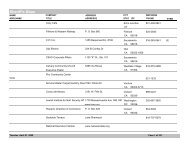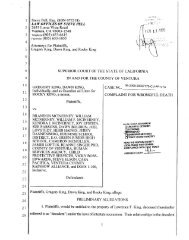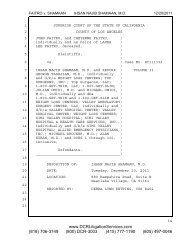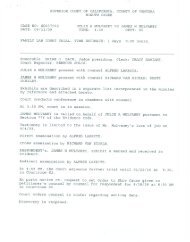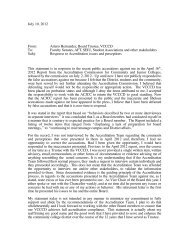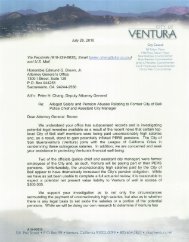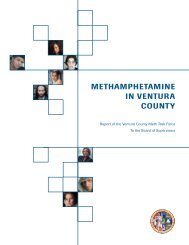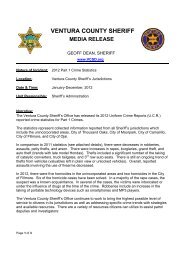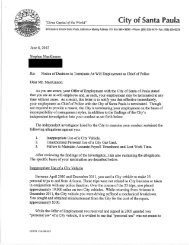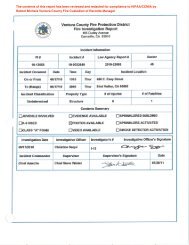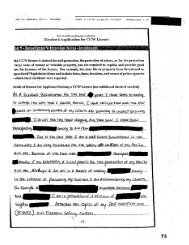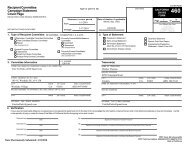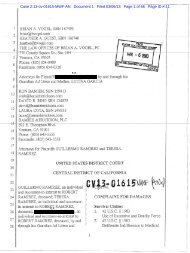Metrolink peer review report - Ventura County Star
Metrolink peer review report - Ventura County Star
Metrolink peer review report - Ventura County Star
Create successful ePaper yourself
Turn your PDF publications into a flip-book with our unique Google optimized e-Paper software.
METROLINK COMMUTER RAIL SAFETY PEER REVIEW PANEL<br />
Final Report – January 5, 2009<br />
f. Railroad Industry Hour of Service/Split Shift Issue<br />
Issue Papers<br />
Observations<br />
Following the Panel presentation to the SCRRA Board on December 12, 2008, the issue came up regarding the<br />
impact of Split Shifts on <strong>Metrolink</strong> train service. The Panel did not study this issue in detail but has presented<br />
below some observations and recommendations.<br />
The current statutory provisions that govern the hours of service of railroad train and engine crews, dispatchers,<br />
and signal maintainers were first enacted in 1907. The FRA has proposed to revise and update these hours of<br />
service laws based on scientific information addressing fatigue-induced performance. As part of this FRA <strong>review</strong>,<br />
the current practice of split shift assignments used by many commuter railroads would be addressed.<br />
The Panel observed that SCRRA has not done an Hours of Service or Split Shift study. Some of the difficulties of<br />
SCRRA conducting this type of study are that SCRRA does not have direct control of the contractors’ employees,<br />
since they are employed by SCRRA’s contractors and those employees’ rates of pay, rules and working conditions<br />
are governed through collective bargaining agreements. Additional difficulties are that SCRRA does not currently<br />
have supervisors in the field where the work is being done and SCRRA staff has not developed statistical measures<br />
for this type of <strong>review</strong>.<br />
The Panel believes that these difficulties can be overcome by conducting an independent study in cooperation<br />
with SCRRA’s contractors. For example, regarding a survey of the contractors’ employees, the independent study<br />
consultant could provide the survey instrument and the survey could be conducted by the contractors themselves.<br />
The analysis of that survey plus any additional analysis of <strong>Metrolink</strong>’s schedules and other data sources would be<br />
done by the independent consultant.<br />
Recommendation<br />
a. Since SCRRA’s Transportation contractor uses split shift assignments in its train and engine crew<br />
schedules, it is the Panel’s recommendation that SCRRA participate actively on the Hours of Service issue<br />
as part of the FRA Rail Safety Advisory Committee (RSAC) process.<br />
b. The Panel also recommends that SCRRA, in cooperation with its operating contractor, conduct a <strong>review</strong> of<br />
its contractor’s Hours of Service Split Shift schedules for their train and engine crews and determine if<br />
fatigue is a factor in the use of Split Shifts. In addition, SCRRA should evaluate whether any relevant rules<br />
and their particular application require any short term measures pending the results of the FRA RSAC<br />
process regarding Hours of Service.<br />
Background<br />
Human factors, in particular, fatigue, are the subjects of increasing study and rulemaking in much of the regulated<br />
transportation sector. One operating practice, split shifts, falls under the study’s purview since it can lengthen a<br />
workday beyond the traditional ”straight eight” However, the practice of split shift assignments in the commuter<br />
rail industry is both common and cost effective because of the service patterns necessary to support the peak<br />
markets of commuter operations. Generally there is a high frequency of train service between 5:00 AM and 9:00<br />
AM to service the demand into major business centers in the morning and between 4:00 PM and 8:00 PM to<br />
return customers to their homes in the evening.<br />
The split shift assignments allow commuter agencies to establish crew assignments to cover both peak periods of<br />
service thereby maximizing their utilization. In the interim period between the morning and evening assignments,<br />
crews are placed on rest for a minimum of four (4) hours. It is the most efficient way to cover the service pattern<br />
61



